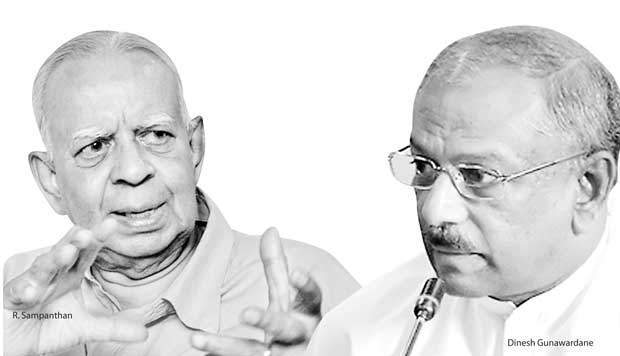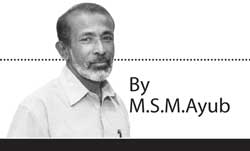Reply To:
Name - Reply Comment


One would agree with Mahajana Eksath Peramuna (MEP) leader Dinesh Gunawardane, who criticised R. Sampanthan for taking up only Tamil issues during his engagements with other politicians and the public instead of discussing national issues as the Opposition Leader of the country.
Sampanthan, in response, had lashed out at the MEP leader and questioned as to whether Southern politicians had taken up issues that affected Tamil people in their engagements with the Government or the people. “They are concerned about the issues around them and we too are concerned about the issues around us” he had told media at a meeting in the North, according to the Tamil media.
He had also pointed out that the southern politicians are normally a-pathetic to the problems faced by the Tamil people and leave them to the Tamil leaders.
The interesting point in this war of words is that both the nationalist leaders on either side of the ethnic divide were correct.
Though Sampanthan was appointed Leader of the Opposition by the Speaker of the Parliament he rarely takes up, even in the House, any national issue unless it has something to do with ethnic relations.
On the other hand, as he had pointed out southern political leaders, irrespective of them even being Ministers, view Tamil issues such as resettlement of people displaced by the war as alien to them, and had left them exclusively to the Tamil leaders. In short both groups are on par with each other in their lack of inclusiveness.
Seven years after the end of the war between the armed forces and the Liberation Tigers of Tamil Eelam (LTTE), there are around three hundred Tamil people, mostly youth, languishing in prisons, of which some have not even been charge sheeted for years. Tamil leaders charge that there are people among those prisoners, who had been arrested under the dreaded Prevention of Terrorism Act (PTA) more than 15 years ago.
When the new Government of President Maithripala Sirisena took steps to release them at least on bail on a staggered basis some southern politicians, especially those in the so-called Joint Opposition including Mr. Gunawardane had opposed the move, leave alone giving voice to their problems.
Inclusivity has been compromised here for a few hundred votes.
The seven years that had elapsed after the decimation of the entire LTTE leadership are quite a long period for the country for being ensured that the LTTE no longer can regroup as a formidable force that can threaten the security of the people as well as the State.
The security situation in the country for the past seven years has also been an attestation to the fact that the Palali Security Forces Headquarters and the air base are no longer vulnerable to artillery or mortar attacks by the LTTE or any other group. Therefore, it is high time that the lands that had been secured by the Army for the creation of High Security Zones in the Jaffna Peninsula during the war be handed over to their rightful owners.
But many southern politicians, especially the leaders of the Joint Opposition do not seem to be in favour of releasing those lands. Thus, these issues- on prisoners, land and many others- also have been left to the Tamil Parliamentarians such as Sampanthan, M.A. Sumanthiran and the Chief Minister of the Northern Province C.V. Wigneswaran.
In a way, Sinhalese leaders also have to take the responsibility for the emergence of dozens of ethnic based political parties and the parties with ethnic tags in their names such as the Tamil Eelam Liberation Organisation (TELO), Eelam People’s Revolutionary Liberation Front (EPRLF) and the Sri Lanka Muslim Congress (SLMC), leave alone the LTTE, since minority issues were left to be handled by the minority leaders.
There were no Sinhalese leaders, except for few leftist leaders, who represented small parties, to fight against the Official Languages Act of 1956 or the Sinhala Only Act- as it is commonly known -that compelled the Tamils, including those living in predominantly Tamil areas, to show their Sinhala proficiency for employment and promotions in the Public Sector.
It was natural then that the Tamils fought against the move in the name of their community. Had there been a strong movement in the south against the Sinhala Only Act, standardisation of university admissions and many other issues, which were the hot topics within the Tamil separatist movement in its early stages, the secessionism would not have taken such a huge toll.
When the southern leaders rescinded some of their earlier moves to give the official language status to the Tamil language as well and to give citizenship and franchise to the Tamils of Indian origin it was too late and the Tamil armed struggle had reached a point of no return. Hence, Sampanthan was correct when he blamed the southern politicians for lack of inclusiveness. However, it did not in any way justify his laxity towards his duties as the Opposition Leader, since a strong Opposition is a must for a healthy democracy. Many important national issues had cropped up for the past one year, which invited a broad public discourse. The Central Bank Bond issue, the appointment of the Attorney General, increasing of number of Ministers, move to increase taxes, the pathetic fate of the anti-corruption drive and the selectivity in implementing law such as the immigration matters involving Wimal Weerawansa and Premakumar Gunaratnam were some of them.
In fact Tamil leaders including the Opposition Leader had distanced themselves from these issues as if they the people they represent are not affected by them.
Besides, it is unethical now on Mr. Sampanthan’s part to keep silent on or to look the other way from national issues, even issues that affect the Sinhalese and Muslims alone, since he is the Opposition Leader in the Parliament representing all communities in the country.
One does not suggest that the Opposition Leader should oppose everything the Government does or proposes to do, as the tradition has been. He is at liberty to support the Government when he feels fit as in the case of the 2016 budget. However, he seems to have forgotten his duty towards all the communities in the country as the Opposition Leader.
Mr. Sampanthan’s involvement in nationally important matters would help promote the much needed reconciliation as well and the Tamil and Muslim people too might come out from the secluded insular mindset they have been pushed into by their leaders during the past several decades.